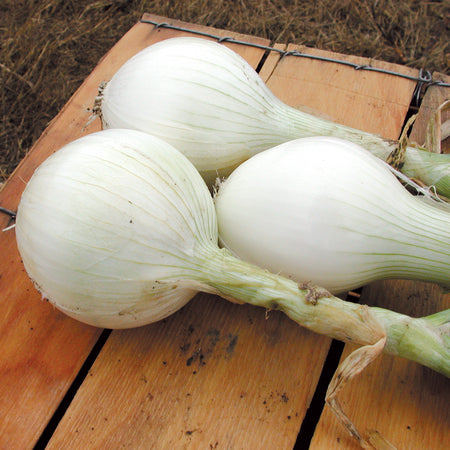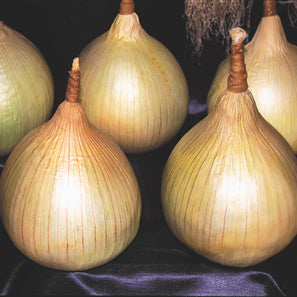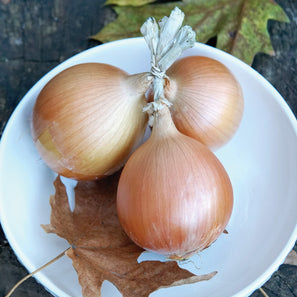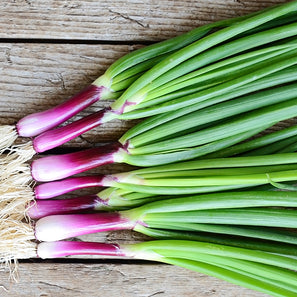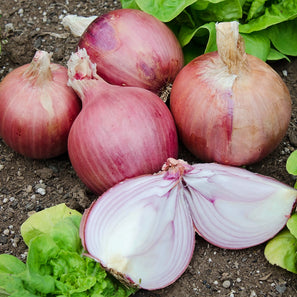SUPERSTAR PLANTS
Product Description:
One Bunch = A minimum of 4 dozen plants. Onion plants are shipped directly from the grower January through early May, according to where you live. Not available to Hawaii, Idaho, or Canada. Cases not available to AK.
To check the estimated ship date for your area click here.
| Soil Temp for Germ | 50–75°F |
| Seed Depth | ⅛–½" |
| Seed Spacing | 2–4/inch |
| Days to Emergence | 6–16 |
| Thin Plants to | 2–7" |
| Row Spacing | 12–24" |
| Fertilizer Needs | Medium |
| Minimum Germination | 75% |
| Seeds per Gram | ≈ 200 |
| Seed Life | 1 year |
Allium cepa Days to maturity are calculated from date of direct seeding.
Culture
• Onions are photoperiodic plants — they regulate their stages of growth by day length
• Onions will make top growth until the critical light duration is reached, then bulbing begins
• The amount of growth and development prior to bulbing will determine the bulb size
• Long-day varieties do well in northern states where summertime day length is between 14-16 hours
• Short-day varieties do well in southern states and bulb when day length is 10-12 hours; they won't get very large in northern states
• Dividing line between short-day and long-day varieties is generally accepted as 36° latitude, roughly along the Kansas/Oklahoma border
• Day-neutral and intermediate-day varieties start bulbing when day length is 12-14 hours; can be successfully grown anywhere
• Onions prefer light, sandy, loamy soils
• Apply 1/4-1/2 cup of TSC's Complete fertilizer per 5 row feet, 1-2 inches below transplant or seed
Direct Sowing
• Thin to the strongest plant when 4-5 inches
Transplanting
• Sow up to 10-12 seeds in a 4-6 inch pot
• If tops reach over 5 inches before transplant, cut to 3 inches
• When planting out carefully separate the seedlings and place in a shallow trench
• Fill trench around seedlings and water in well
Insects & Diseases
• Common insects: Onion thrips and maggots
• Insect control: Pyrethrin or Predatory Nematodes
• Common diseases: Fusarium basal rot, pink root
• Disease prevention: 5-7 year crop rotation
Harvest & Storage
• For scallions: harvest when pencil size or larger, wash and trim roots, store in a bag at 36°F and 95% relative humidity
• As bulbs approach maturity, withhold water so protective paper can form
• After about half the tops have fallen, push over the remainder; wait about 1 week then harvest
• Cure in a warm (75-80°F), shaded, well-ventilated location until outer skin and necks are dry, then trim tops, leaving one inch above the bulb
• Store in a cool, dry, well-ventilated area
• Check occasionally and immediately remove any sprouting or rotting onions
What is pelleted seed?
Seed that has been coated with a clay-based material to form a larger, round shape. This makes planting by hand or mechanical seeder easier and allows for more controlled sowing of small seeds such as carrots or lettuce. All pelleted seed has a National Organic Program (NOP) approved coating.
For best results, store pelleted seed in an air-tight container and use within one season.
What is seed tape?
Seed tapes are perfectly straight rows of precisely spaced crops. No more having to thin seedlings! This biodegradable tape will plant a row 5 meters (16 feet, 5 inches) long. Simply lay it in a furrow and cover with a light layer of sifted compost or soil, water and wait. Save yourself a heap of planting time with these popular vegetable and herb staples.

